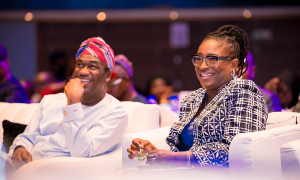Towards attaining its decarbonisation objective, Lagos State, through the office of Sustainable Development Goals, in collaboration with Lagos State Environmental Protection Agency (LASEPA) and the Lagos State Safety Commission, has launched its carbon registry at the inaugural Lagos State Sustainability Summit (LSS) held recently.
Speaking, the Governor of Lagos, Babajide Olusola Sanwo-Olu, who was represented by his deputy, Kadri Obafemi Hamzat, said the summit serves as a moment to build consensus and forge new partnerships around the priorities shared.
“Lagos State Development Plan (2022–2052) sets the framework for our long-term vision. It emphasises four key pillars: economic growth, human capital development, infrastructure expansion, and environmental sustainability. At the heart of this plan is a commitment to using technology, innovation, and inclusive governance to build a city capable of adapting to an unpredictable future.”
In her remark, the Special Adviser to Governor Babajide Sanwo-Olu on Sustainable Development Goals and the Convener of LSS, Oreoluwa Finnih, who commended efforts of the three bodies instrumental to the realisation of the summit, said its thematic preoccupation is ‘Building a Resilient and Sustainable Lagos’.
Finnih revealed that the summit is a result of a genuine collaboration and a thirst for excellence. “The idea is to align our activities with the global Sustainable Development Goals (SDGs) and ensure that the vision of a sustainable and resilient Lagos becomes a reality. “
Introducing the carbon registry during the summit, the General Manager LASEPA, Babatunde Ajayi, said Lagos State is at the forefront of decarbonisation in Nigeria. He revealed that the registry was launched for accurate monitoring and reporting of emissions in order to improve public health and help mitigate climate change.
“The registry would also enhance international and national developmental goals as well as regulatory compliance, to drive innovation and sustainable practices and to tap into economic opportunities in a $50 billion dollar market.”
During his keynote address, Rabiu Olowo, executive secretary and chief executive officer, Financial Reporting Council (FRC) of Nigeria said the FRC plays a crucial role in advancing sustainability practices through several key functions and initiatives which includes establishing and enforcing reporting standard, promoting best practices in corporate governance, training and education, facilitating transparency and accountability, monitoring and compliance, encouraging innovation and adoption of sustainable practice and collaboration with stakeholders.
